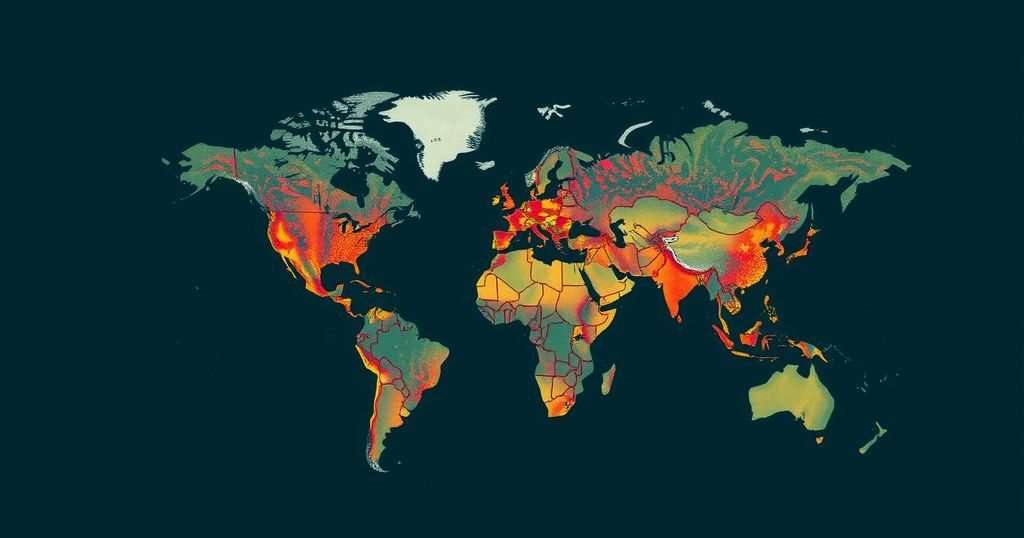Climate Change Drives Record Threats to Global Health

A new report reveals that climate change is causing unprecedented threats to global health. It highlights record increases in extreme weather events, health issues related to rising temperatures, and the ongoing loss of tree cover. Experts have warned that delays in addressing climate crises have serious ramifications for human life. Despite the challenges, there have been some improvements in air quality and renewable energy adoption, which provide hope for future progress. The urgent need for action is emphasized, calling for individual responsibility and systemic change to combat climate change effectively.
A recent report published by the eighth Lancet Countdown on health and climate change highlights the profound impact of climate change on global health, revealing that unprecedented threats are emerging at alarming rates. Experts have warned that the time lost in addressing these issues has translated into significant loss of life. The report was released amid a backdrop of extreme weather phenomena, including heatwaves, wildfires, hurricane activity, and severe droughts and floods, all contributing to 2023 likely becoming the hottest year on record. The report—the work of 122 specialists from various health and environmental organizations—documents concerning trends across 15 key indicators, with 10 reaching new alarming highs. These trends encompass an escalation in extreme weather events, a staggering 167 percent increase in heat-related fatalities among individuals over 65 since the 1990s, and a marked rise in infectious diseases linked to changing climate conditions, such as the growing prevalence of dengue fever, which surged to over five million cases in the previous year. Furthermore, the report notes the detrimental effects of environmental degradation, with 5 percent of global tree cover lost between 2016 and 2022, impairing the Earth’s ability to absorb carbon dioxide emissions. It criticizes certain stakeholders, including fossil fuel companies and governments, for perpetuating the climate crisis. Despite long-standing warnings about climate change, greenhouse gas emissions continue to escalate, with major oil and gas corporations increasing fossil fuel production to unprecedented levels and governments providing $1.4 trillion in subsidies to fossil fuels in 2022 alone to combat rising energy prices triggered by geopolitical conflicts. While there are disturbing metrics throughout the report, there are also signs of progress. Notably, deaths attributable to fossil fuel-related air pollution decreased by nearly 7 percent from 2016 to 2021, due largely to initiatives aimed at reducing coal pollution. Additionally, the share of clean renewable energy in electricity generation nearly doubled during that timeframe, representing a shift toward viable energy solutions. Moreover, increasing attention to health issues in climate negotiations is encouraging. Marina Romanello, the executive director of the Lancet Countdown, emphasized the current urgency of action, advocating for individuals to adopt environmentally-friendly practices, such as reforming dietary habits, utilizing clean transportation methods, and supporting political candidates who prioritize substantial climate action. Romanello urged that sufficient time remains to avert disastrous outcomes, reiterating that the livestock lost in delaying effective responses has already cost many lives.
Climate change is increasingly recognized as a critical threat to public health globally. The Lancet Countdown report serves as a vital instrument for understanding the multifaceted risks posed by climate change, especially during a time when extreme weather conditions are on the rise. As health professionals and climate scientists converge to analyze data over the past eight years, the results indicate a stark warning about the health implications associated with climate-related economic and industrial practices. This context is further underscored by impending international climate talks, underscoring the urgency for collective action and strategic policymaking.
The report from the Lancet Countdown elucidates the escalating threats climate change poses to human health while highlighting the pressing need for immediate action. Record levels of heat-related deaths, the amplification of infectious diseases, and the ongoing degradation of natural resources necessitate substantial policy changes and global cooperation. Concurrently, there are positive trends in reducing pollution and increasing reliance on renewable energy. The urgency for individual and collective action against climate change cannot be overstated, as the consequences of inaction become increasingly dire.
Original Source: jen.jiji.com






